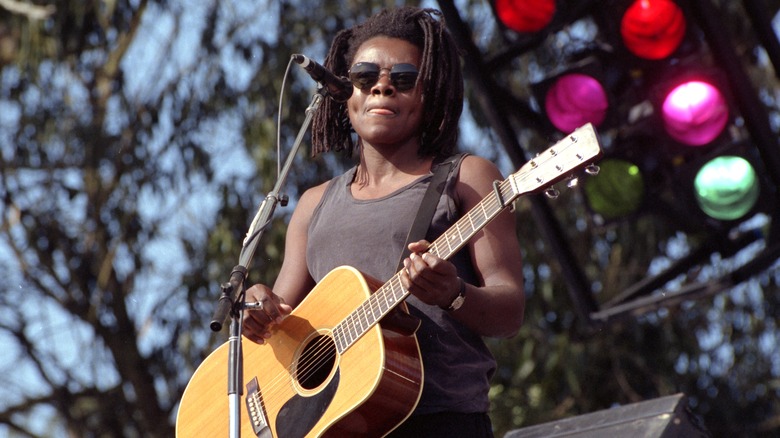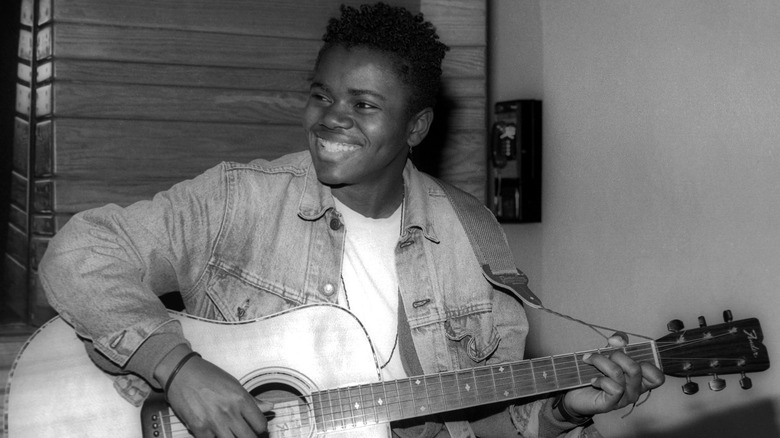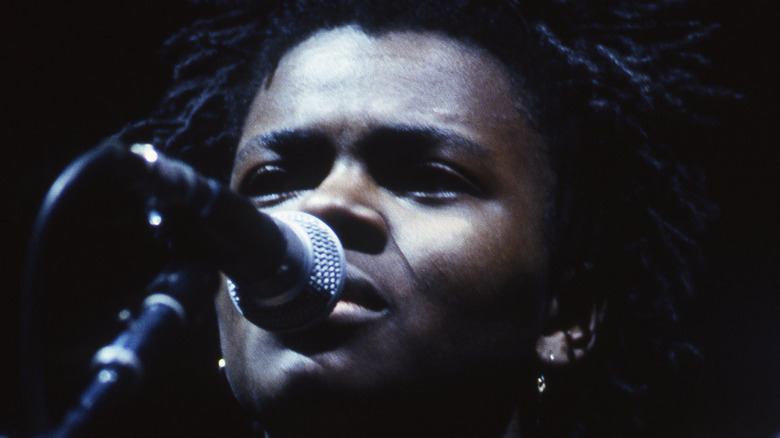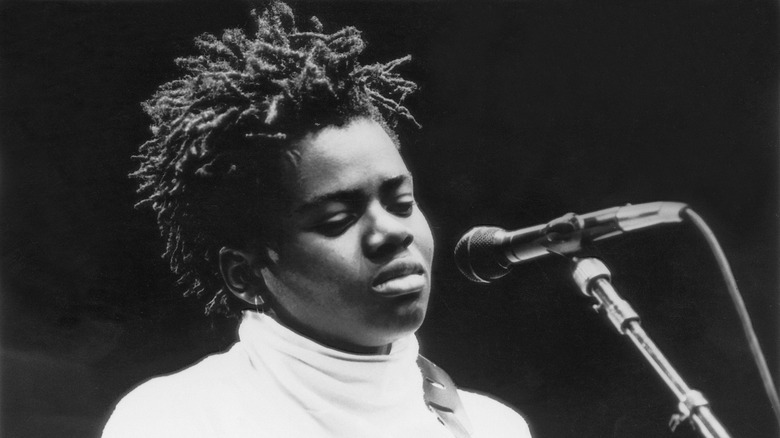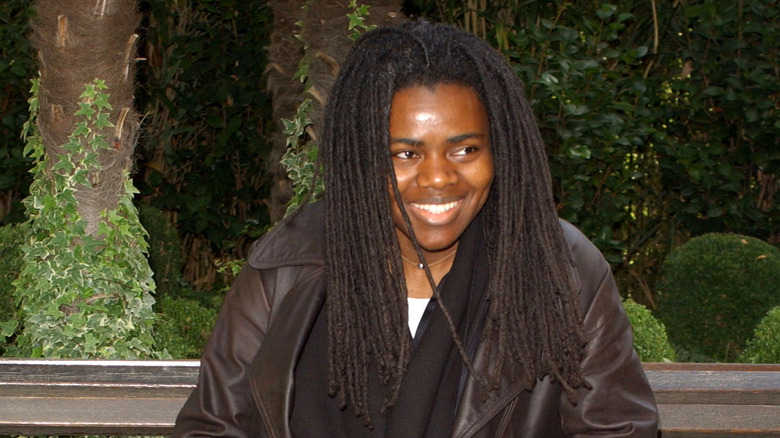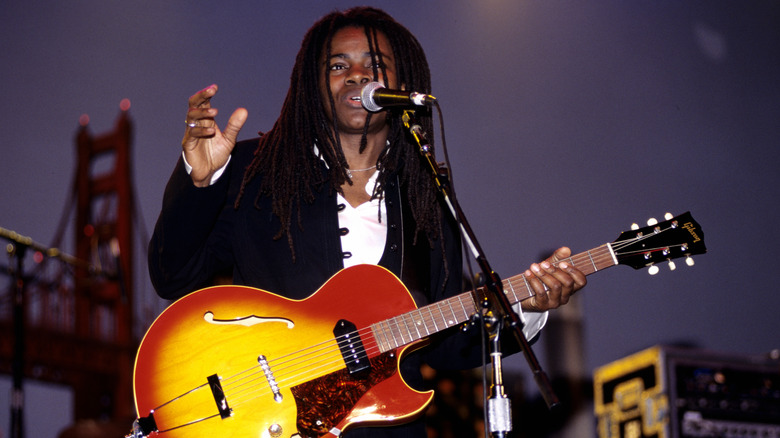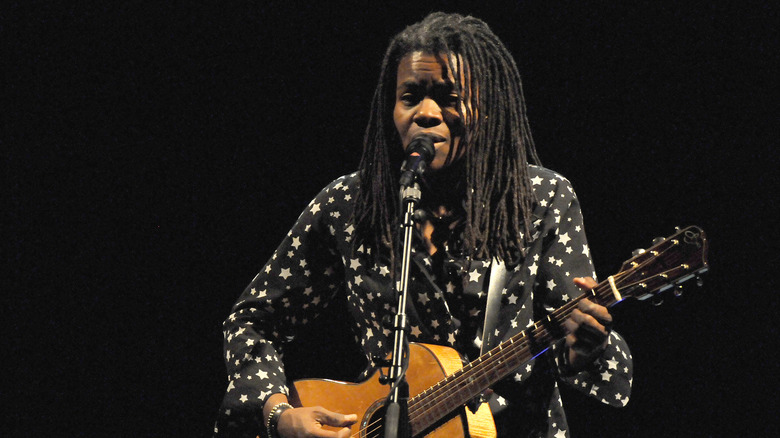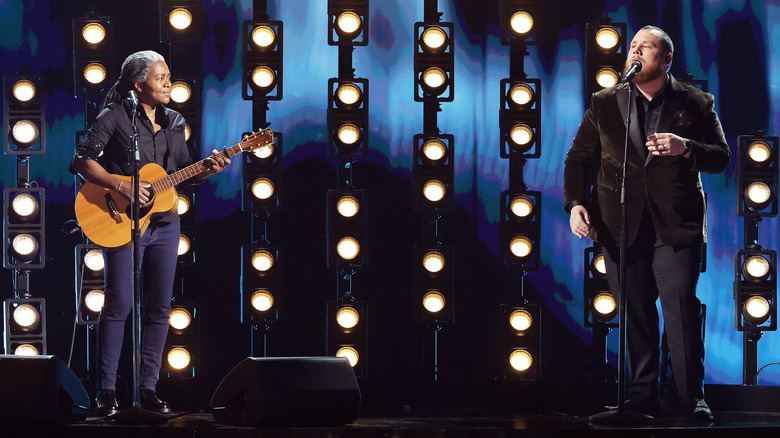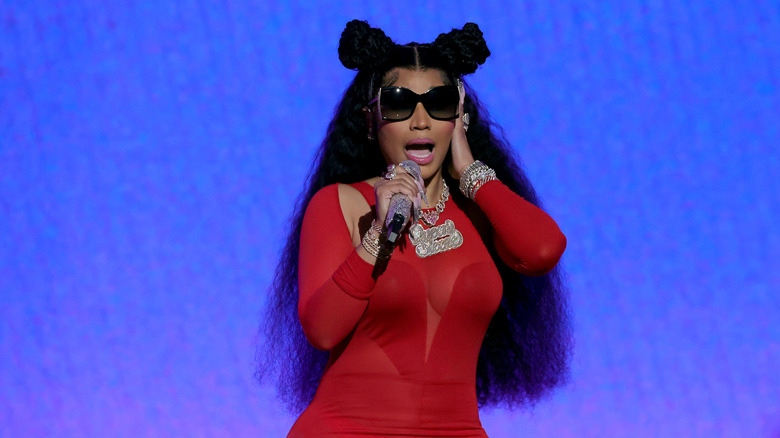The Untold Truth Of Tracy Chapman
Few artists have broken into the mainstream with quite as seismic an effect as Tracy Chapman. At 24 years old, the Ohio-born musician's self-titled debut album topped the charts around the world in markets including the U.S., the U.K., Germany, and Canada, propelled in no small part by her timeless debut single, "Fast Car," which remains her signature and one of the most loved folk songs of recent decades. "Tracy Chapman" eventually went six times platinum in the U.S. Her discography, which now encompasses eight studio albums, has earned her a loyal listenership.
But while many of Chapman's millions of fans may feel a personal connection to the award-winning songwriter, Chapman has generally stayed away from the celebrity limelight, prompting fans to wonder what happened to her. That's why her appearance at the 2024 Grammy Awards, when she performed "Fast Car" alongside country music star Luke Combs, prompted such a warm response from viewers. With Chapman's appearances becoming few and far between in recent years, many have found themselves asking what her story is, especially as she hasn't released any new material since 2008.
For one of the most respected songwriters and performers in living memory, little is known about Chapman's personal life, for reasons this article will discuss. But for those who have found their curiosity about the singer aroused by her recent Grammy performance, here are some little-known tidbits to get you closer to the woman behind the magical music.
She suffered trauma due to racial attacks at an early age
Tracy Chapman has always exuded a calm and gentle aura about her, but the fact is her early life was anything but calm. Born in Cleveland, Ohio, on March 30, 1964, she was raised in a single-parent household by her mother, who bought Chapman her first instrument: a ukulele, which, according to her official biography (via About Tracy Chapman), was stolen from her by another young girl from a neighboring house. The family was working class and Chapman and her sister were raised on welfare.
But while she came from a loving home with a mother who happily indulged her daughter's musical interests, there was trouble to come at high school, when the state of Ohio took steps to integrate schools. While the move was obviously intended as a step toward greater racial equality, it proved dangerous for Chapman, who would be bullied and beaten brutally by white students. In one especially harrowing experience which she related in an interview with Charlie Rose in 1996, she was threatened with a gun by a fellow student, who instructed her to run or else be shot (via YouTube). Chapman described herself as being in the middle of a "race riot." But her ordeal in her home state was soon to end.
Talkin' 'bout a Revolution was based on her experiences at boarding school
Though Tracy Chapman came from a poor background, as a teenager she won a scholarship to a prestigious boarding school in Connecticut, which allowed her to escape from the threat of violence she had often encountered at public school in Ohio. On the face of it, the scholarship was a dream come true for the budding musician, who at the time was also harboring an ambition to become a veterinarian. But as she explained in a rare interview recorded before she was famous, her experiences at the school also led in part to her political awakening and shaped the direction of her songwriting.
Speaking in 1986 — by which time she had been performing in Boston cafes for around four years — Chapman claims that though she was given a big opportunity in terms of her education by going to boarding school, she found that, as a scholarship student surrounded by students from wealthy backgrounds whose attendance was funded by their parents, there was little understanding of working-class people or those with less privileged backgrounds (per Facebook). Chapman claims that the anger she felt regarding the elitist attitudes she encountered during her first year at boarding school compelled her to write one of her most significant early songs: "Talkin' 'bout a Revolution," which she completed when she was just 16 years old. After it was released as one of the singles from her debut album, it would go on to be one of her best-loved works.
She faced both good fortune and tragedy with her manager and producer
While a student, Tracy Chapman quickly became a notable performer on the Boston folk scene thanks to her numerous cafe and street performances, which caught the attention of fellow Tufts University student Brian Koppelman. Recognizing her potential, Koppelman suggested her to his father, the music publishing mogul Charles Koppelman.
Even more luck came her way when she made the acquaintance of Elliot Roberts, a music industry veteran who would become her first manager. Roberts had a folk music pedigree, and his previous stewardship of some of the biggest names in the business like Neil Young and Joni Mitchell suggested he would be the perfect person to bring Chapman's tender but politically charged songs to the mainstream music industry of the late 1980s, at a time when the charts were dominated by synth-pop and hair metal.
But the early days of her career were also beset by tragedy. Having got her foot in the door of the music industry, Chapman was due to record her debut with the legendary producer Alex Sadkin, who had previously worked with a jaw-dropping roster of pop talent. Sadly, Sadkin died in a traffic collision just before recording was due to begin, plunging the Chapman camp into crisis, during which time she was made to record with an unknown studio producer. "Had that record come out I wouldn't be talking to you today," she told Sublime Magazine in 2008.
She blew up thanks to a slot at Nelson Mandela's 70th birthday tribute
Even performers as gifted as Tracy Chapman need some good luck to help propel them on their journey to stardom. And for Chapman that came in 1988, when a last-minute cancellation gave her a headline slot at one of the biggest concerts of the decade.
1988 was the year of Nelson Mandela's 70th birthday. By then, the leader of South Africa's anti-apartheid ANC had spent nearly 25 years in prison for his activism, and pressure was increasing on the apartheid government to release him. To affect change, Mandela's allies organized an enormous tribute concert at London's Wembley Stadium, featuring some of the biggest artists of the day, which was to be broadcast around the world. Though just a newcomer, Chapman was also on the bill, although she recalled in her Sublime Magazine interview that she didn't know when she was scheduled to play.
Stevie Wonder was meant to perform in what Chapman describes as a "primetime slot," but according to Chapman's official biography, the soul and funk icon, who was at the time experimenting with electronics in his live act, found that his technology had failed and he was unable to perform. Chapman was rushed on in his place, offering a very different performance with an acoustic guitar. Her set was the talk of the night, and won her adoring fans across the globe who snapped up her debut album in droves.
Some Black radio stations wouldn't play her music
The Nelson Mandela 70th birthday tribute show supercharged Tracy Chapman's career, laying the groundwork for her immense success at the Grammys in March 1989, when she took home three awards: Best Contemporary Folk Recording, Best Female Pop Vocal Performance, and Best New Artist.
But despite her success and her starring role at a decisive moment in Black history, many Black radio stations were reportedly nonplussed by Chapman's music and were hesitant to play it — much to Chapman's disappointment. As she told The San Diego Union-Tribune in 1990, by which time she had also released her acclaimed sophomore album, "Crossroads," her work being primarily in the folk genre seemed to go against what was expected of Black artists at the time, when many people questioned why she didn't write and perform R&B. "It does frustrate me," Chapman said, "in the sense that I think their format is much too limited. I think they do a disservice to their audience by only presenting certain types of music ... I have an understanding of the fact that the music I'm making doesn't fit their format and, therefore, there's no place for me." The songwriter compared herself to the guitarist Jimi Hendrix, whose rock influences alienated some Black listeners when he first emerged. "I think it's really interesting because he was doing his own thing, instead of what was expected of Black musicians at the time," Chapman said. "I have a lot of respect for him."
She's more lighthearted than her music suggests
As already mentioned, Tracy Chapman was somewhat out of place as a chart-topping songwriter in the late 1980s, when sincerity, political activism, and vulnerable displays of emotion were somewhat out of fashion. Of course, that all changed following her undeniable critical and commercial success, after which record labels across the country took fresh notice of the humbler, folk-centric songwriters who had continued to exist in one form or another since the dawn of the 1960s counterculture.
"People have this impression I sit around all day moping or crying about the state of the world. I guess I can say I don't spend most of my time doing that," she told The San Diego Union-Tribune back in 1990. The same publication notes that despite her public persona she was easy to laugh throughout the interview, and indeed in video clips from both before she was famous and after she had become a multi-Grammy Award-winning artist, she is quick to smile and share a joke with her interviewer, often at her own expense.
She looked set to drop out of the industry
After the success of "Tracy Chapman," the songwriter's sophomore album, "Crossroads," had a lot to live up to. It was released in 1989, only a year after her debut and just six months after her multiple victories at that year's Grammys. Though the album was generally well received, it wasn't the critical darling that her debut was, and its commercial performance was also a step down for Chapman, who decided to take more time over her third album. "Matter of the Heart" arrived in 1992, but where "Crossroads" had still managed to crack the Top 10 of the Billboard 200, "Matter of the Heart" languished at No. 53. The record saw a marked shift in Chapman's sound, away from the acoustic folk for which she was known, with a step toward alternative rock. The record alienated many of her fans, and for a while it seemed that Chapman had reached a dead end in terms of her artistry.
There was a three-year gap between "Crossroads" and "Matters of the Heart," after which Chapman once again left the public eye. She eventually re-emerged in 1995, and her return proved triumphant. Her fourth album, the aptly titled "New Beginning," featuring the hit single "Give Me One Reason," was an immediate success, with the album going gold the week the single was released. The album eventually went five times platinum, cementing Chapman's legacy as one of the most important solo artists of her era.
She has never commented on her romantic life
In 1986, Tracy Chapman commented that her songwriting tends to emerge from either an emotional or a political standpoint: Either songs are about her own feelings, or are about issues the wider world faces. And it's true that both sides of her artistry are central to her appeal to her millions of fans.
Chapman has been open throughout her career about her political beliefs, but while her songwriting focusing on love and relationships is often confessional and surely drawn from personal experience, she has made a conscious effort through the years to avoid discussing her personal life in interviews. "It's nice to know that people appreciate the record ... but I'm just a really private person," she told Rolling Stone in 1988. "If, somehow, I could walk around invisible when I'm not onstage ..."
Despite Chapman remaining tight-lipped about her personal life, Alice Walker, author of the classic (and frequently banned) novel "The Color Purple," has claimed that she was in a relationship with Chapman for a time in the 1990s. However, Chapman has never confirmed or denied the claim, and has chosen to keep her sexuality private.
Her new popularity among country music fans is fitting
In 2023, Tracy Chapman's music was again in the charts thanks to the release of a cover version of "Fast Car" recorded by North Carolina-born country music singer Luke Combs as the second single of his fourth album, "Gettin' Old." The new version proved to be a huge hit, topping the country music charts, hitting No. 2 on the Billboard Hot 100, and winning the Country Music Association award for Song of the Year.
Combs has been vocal in his love of Chapman's music, particularly her signature song "Fast Car," stating in a speech on receipt of the award that he thanked Chapman "for writing one of the best songs of all time ... I just recorded it because I loved the song. It's the first favorite song that I ever had, at 4 years old," per The Guardian. The success of "Fast Car" also made Chapman the first Black woman to top the country chart with a solo writing credit. She has been effusive in her support for Combs' version, and indeed Chapman's association with country music goes back farther than many fans realize: According to an interview with NPR, the folk singer recalls that she may first have been inspired to take up the guitar after watching "Hee Haw," a country music variety TV show, when she was a child.
She sued Nicki Minaj
Tracy Chapman is often characterized by journalists as a gentle, unassuming, and humble person, at odds with the bombastic and caustic personas of many modern pop stars. However, she was made to show her teeth in 2018, when it was reported that she was taking the "Pink Friday" rapper Nicki Minaj (pictured) to court.
According to court documents obtained by The Independent, Chapman was suing Minaj for copyright infringement, claiming that Minaj had sampled her 1988 song "Baby Can I Hold You" without permission. The sample appears in a song called "Sorry," which was leaked online on the website of DJ Funkmaster Flex. The song — which featured melody and lyrics from Chapman's composition — was later removed, but Chapman decided to take legal action because Minaj's team had previously approached her for sample clearance and the request had been denied.
Though Minaj's team claimed in 2019 that there was no copyright infringement, in 2021 a judge awarded Chapman $450,000. A section of a statement from Chapman released by her representative read: "I was asked in this situation numerous times for permission to use my song; in each instance, politely and in a timely manner, I unequivocally said no. Apparently Ms. Minaj chose not to hear and used my composition despite my clear and express intentions. As a songwriter and an independent publisher, I have been known to be protective of my work. I have never authorized the use of my songs for samples or requested a sample."
Her 2024 Grammys performance was an incredibly rare public appearance
With "Fast Car" receiving plenty of airplay in 2023 and 2024 thanks to Luke Combs' platinum-selling version that has shifted more than 2 million units in the U.S. alone, Tracy Chapman's music has reached a new generation of fans. And there was great excitement for fans old and new when Chapman took to the stage at the 2024 Grammy Awards to perform a duet of her signature song with Combs, in what many outlets described as the highlight of the evening.
But perhaps few of the new batch of Chapman devotees might realize quite how rare such an appearance from the multi-Grammy Award-winning artist is nowadays. Chapman's latest studio album, "Our Bright Future," came out way back in 2008. The following year was the last time she performed as part of a live concert tour. Since then, The San Diego Union-Tribune claims that she has made just three televised appearances over the course of 15 years: in 2012 at a tribute concert for Buddy Guy, in 2015 as part of David Letterman's send-off from "The Late Show," and once more in 2020, when she performed "Talkin' 'bout a Revolution" as part of a voter registration drive. Chapman's 2024 Grammys performance has seen her original version of "Fast Car" top the Spotify charts. Whether it will lead to her re-emergence as a recording and touring musician once more as she enters her sixth decade, only time will tell.
